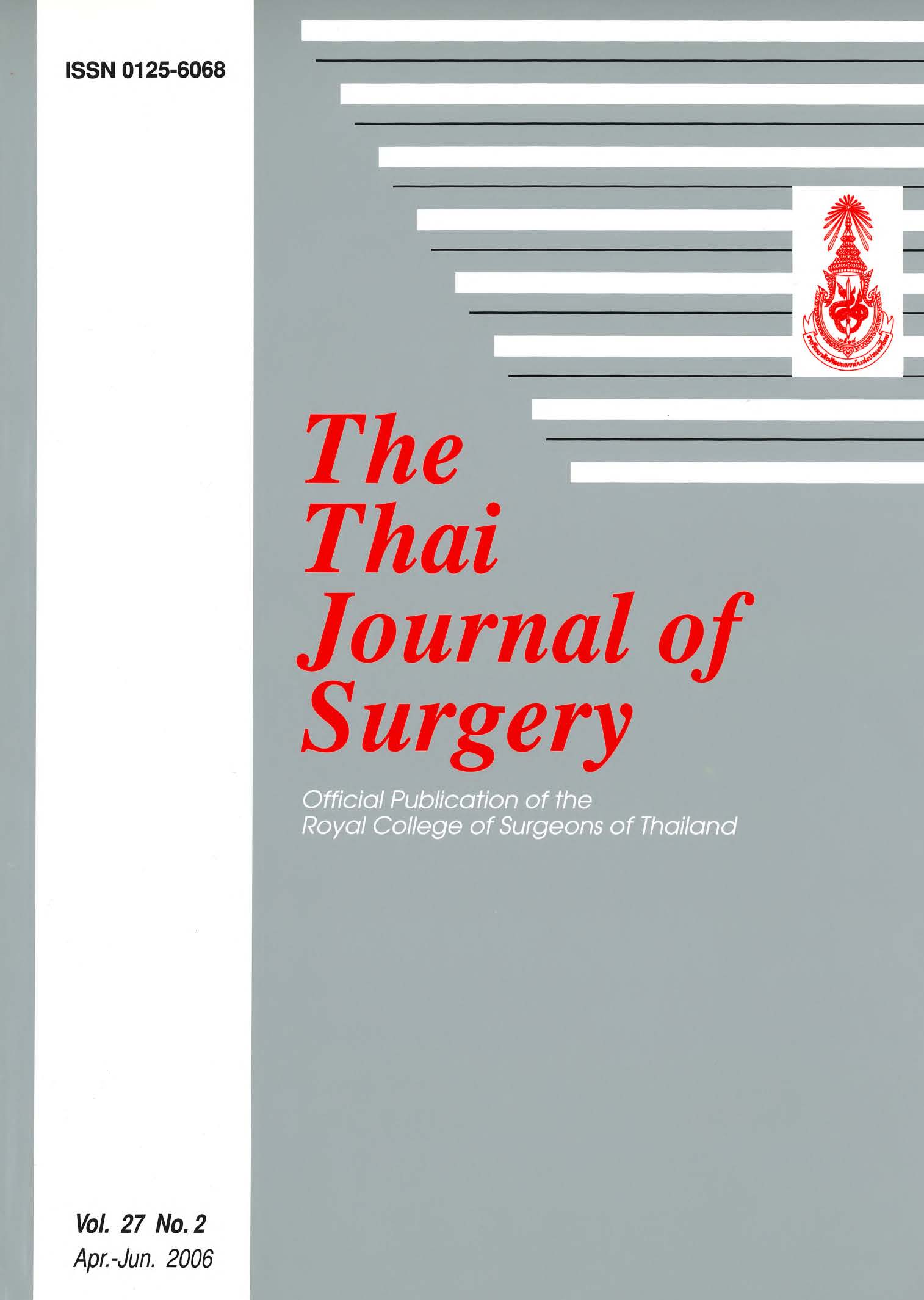Life after Cancer Treatment: Fear of Recurrence among Thai Colorectal Cancer Survivors
Abstract
Background: After cancer treatment, cancer survivors have been living with fear of recurrence more than people with other kinds of illness. Because cancer is such a difficult illness to treat, there is a chance that it might come back again. Psychological consequence of fear that cancer recurrence could occur following transition from patient to survivor status may interfere and diminish their quality of life.
Objectives: The study was aimed at exploring and describing life after cancer treatment among Thai colorectal cancer survivors focusing on experiences surrounding fear of cancer recurrence.
Materials and Methods: The qualitative research method was employed to gain, in depth, qualitative data. By interviews and participant observation data, an understanding and explanation of this social phenomenon are hoped to be achieved. The participants of this study composed of 22 Thai colorectal cancer survivors who had completed over one year of cancer treatment. In-depth interviews, close observation and field notes were used to collect data. The constant comparative method was used to analyze the data collected as well as inductive and deductive approach. Through the use of this method in the analysis of data, patterns in the data/behavior can be ascertained and a general concept developed.
Results: Analysis of the data provided evidence supporting a distinct pattern in which the fear of cancer recurrence among Thai colorectal cancer survivors was coupled by the fear of death, the fear of re-treatment and the fear of suffering. Fear of recurrence always occurs when facing medical appointments, health deviation and arousing media. The intensity of fear of cancer recurrence varies and was dependent on time elapsed, but for some survivors the fear was constant throughout. The fear may effect daily life and induce hypersurveillance. As a result, coping strategies were identified. These strategies included deflecting bad thought through activities, self-control, self-entertaining, suppression, denying, positive thought, relying on treating physician, utilizing alternative prophylaxis, religious activity and increasing self-strength. Belief, faith and hope are crucial mechanisms in driving coping behaviors.
Conclusions: Fear of cancer recurrence may interfere with a cancer survivor's daily rituals and routines. Yet, a normal level of fear of recurrence may assist colorectal cancer survivors in controlling and adjusting to the situation and build a stronger sense of security. Focus on one's belief, faith and hope play an integral role in determining coping strategies and attaining life balance.
References
2. Barraclough J. Cancer and emotion; a practice guide to psycho-oncology. New York: John Wiely & Sons; 1999.
3. Holland JC. Psycho oncology. New York; Oxford University Press; 1998.
4. Lee-Jones C, Humphris G. Fear of cancer recurrence. A literature review and proposed cognitive formulation to explain exacerbation of recurrence fears. Psycho-Oncology 1997;6:95-105.
5. Villagomerza LR, Spiritual distress in adult cancer patients toward conceptual clarity. Holistic Nursing Practice 2005; 19:285-95.
6. Schover SMJ. Partial mastectomy and breast reconstruction: a comparison of their effect on psychological adjustment, body image and sexuality. Cancer 1995;75:54-76.
7. Vickberg SJ. The concern about recurrence scale CARS): a systematic measure of women's fears about the possibility of breast cancer recurrence. Soc Behavior Med 2003; 25:16-24.
8. Ness RM, Holmes A, Klein R, Greene J, Dittus R. Outcome states of colorectal cancer: identification and description using patient focus groups. Am J Gastroenterol 1998; 93:141-9.
9. Northhouse L, Mood D, Templin T, Mellon S, George T. Couples' patterns adjustment to colon cancer. Social Sci Med 2002:50: 271-84.
10. Werner JS, Frost MH. Stress and coping: state of the science and implications for nursing theory, research, and practice 1991-1995. USA. Midwest Nursing Research Society; 2000.
11. Nelson JP. Struggling to gain meaning: living with the uncertainty of breast cancer (Living with Chronic illness). Advances Nurs Sci 1996; 3.
12. Jirajaus M. Development of self-care agency model in colorectal and anal cancer patients receiving treatments in outpatient clinical. Master thesis, Adult Nursing. Graduated School, Mahidol University; 1996;3.
13. Lumdubwong A. The relationship between the characteristics of information and uncertainty in illness in post-operative colorectal patients during hospitalization. Master Thesis, Adult nursing. Graduate School, Mahidol University;2001.
14. Pongyart A, Facilitation of Buddhism Meditation Training to relieve anxiety among colorectal cancer patients. Master Thesis, Public Health Nursing Faculty of Graduate Studies, Mahidol University; 2000.
15. Quinn KA. Screening for psychological distress in adult patients with cancer: a systematic review. Master of Nursing. School of Postgraduate Nursing, Faculty of Medicine, Dentistry, and health science, University of Melbourne; 2002.
16. Mohon SM. Managing psychological consequence of cancer recurrence: implication for nurse. Oncol Nurs Forum 1990; 3:47-52.
17. Algase DL. Fear and anxiety: a simultaneous concepts analysis. Nurs Diagn1999;7 (1),
18. Goldman HH. Review of general psychiatry. California, LANGE Medical Publication/ Losaltos, 1984.
19. Lee-Jones C, Humphris G. Fear of cancer recurrence – a literature review and proposed cognitive formulation to explain exacerbation of recurrence fears. Psycho-Oncology 1997;6: 95-105.
20. Boyd MA, Nihart MA. Psychaitric nursing: contemporary practice. Philadelphia: Lippincott; 1998,
21. Aziz N M. Long-term survivorship: late effects. In: Principles and Practice of Palliative Care and Supportive Oncology. Philadelphia: Lippincott Williams & Wilkins, 2002.
Downloads
Published
How to Cite
Issue
Section
License
Articles must be contributed solely to The Thai Journal of Surgery and when published become the property of the Royal College of Surgeons of Thailand. The Royal College of Surgeons of Thailand reserves copyright on all published materials and such materials may not be reproduced in any form without the written permission.



